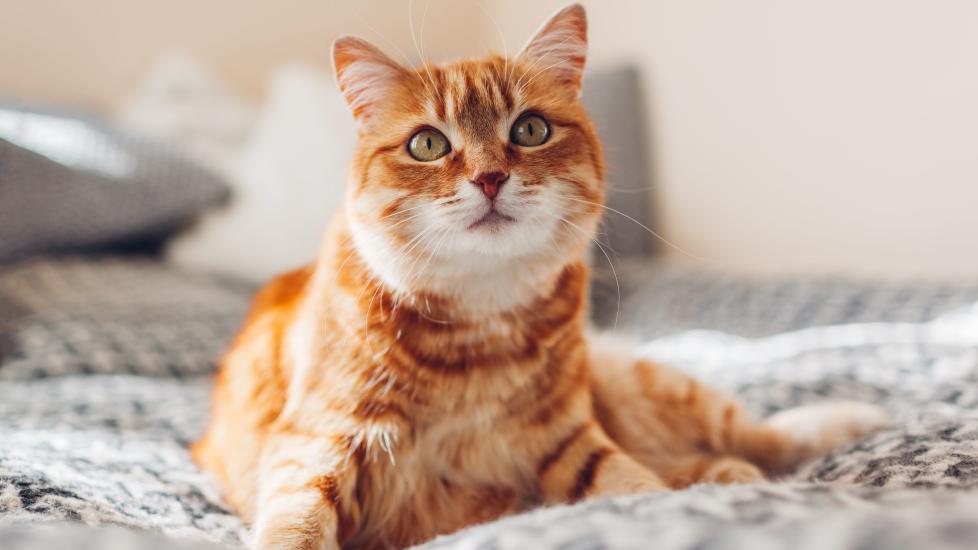How Smart Are Cats?
Adobe Stock/maryviolet
Cats have many wonderful qualities, but are they smart? The short answer is yes. Cats have evolved over thousands of years to develop the intelligence they need to succeed as cats. In other words: Cats are the smartest at being cats.
But what about your specific cat? Let’s look at what science has to say about feline intelligence.
What Is the Average IQ of a Cat?
It’s impossible to use the concept of IQ (intelligence quotient) in any species other than humans. A person’s IQ can be measured in many ways, but good tests are standardized and based on research that simply doesn’t exist for animals. There is no way to measure a cat’s IQ, and therefore no way to talk about the average IQ of a cat.
Instead, researchers interested in animal intelligence investigate cognition, which can be thought of as the ways that animals gather information, make decisions, and then behave.
Here are a few highlights from a review of cat cognition research:
-
Cats have a sense of object permanence. When they see an object that is then hidden, they know it hasn’t disappeared but that it is, for example, under the box.
-
Cats have working memory and a well-developed long-term memory. This allows them to accomplish what they want, even if they are initially prevented from doing so.
-
Cats can tell the difference between shorter and longer periods of time, and recognize different quantities.
-
Cats will look for human cues and gestures and can respond to human moods.
-
Cats can recognize specific human voices and become attached to people in their lives.
People tend to equate a cat’s cognitive abilities (some of them, at least) to those of a typical human toddler.
Are Cats Smarter Than Dogs?
Broadly speaking, cat intelligence is often characterized in the same way as dog intelligence—namely, that both are similar to human toddlers. But as you would expect, cats and dogs are smart in different ways.
Here’s a good example: Dogs are social creatures. Cats are social when it suits them but can also take on a more solitary lifestyle. So it shouldn’t be too surprising that dogs turn to people more often for social cues, while cats more frequently try to solve problems on their own. Both traits are signs of intelligence that fit with how each species moves through the world.
Signs of a Smart Cat
Cats are all individuals, so one may be intelligent in one aspect of life while their housemate could excel in another (or not!).
For example, one of your cats may be a master problem-solver. Hide their treats, and they will climb on any counter or open any cabinet door to chew through the bag and indulge. On the other hand, your other cat could be the equivalent of your feline therapist: They might immediately sense when you are having a bad day, purring and rubbing against you to help you feel better fast.
Which cat is smarter? That wholly depends on your definition of smart. Simply put, any cat that wants something and can figure out a way to get it is pretty smart.
What Are the Smartest Cat Breeds?
Some cat breeds have a reputation for being smarter than others, such as:
Of course, as any breed fancier will tell you, some individuals don’t seem to read the playbook. Whether it’s because of a genetic fluke or the way they were raised, it’s certainly possible to find dimmer cats from smart breeds and vice versa.
How To Test Your Cat’s Intelligence
While an official IQ test for cats doesn’t exist, you can run an experiment at home to get a feel for how smart your cat might be.
-
Gather one of your cat’s favorite treats or toys and a cup or small box your cat can’t see through.
-
Sit beside your cat and let them see you place the treat or toy under the upside-down cup or box.
-
Step back and see what your cat does.
If your cat immediately flips the container to get what they want, you might have a feline genius on your hands. If kitty takes a while to investigate the situation and then paws around under the container, eventually extracting their treat or toy, your cat is a solid student of the world.
But if your cat looks at you with a confused “I guess that’s gone forever!” look in their eyes and goes about their business, smarts may not be your cat’s strongest quality. Or maybe they just don’t really want what you hid from them!
If you want to take your cat’s intelligence testing up a notch, measure how long they can remember that you put an object under the container.
-
Follow steps one and two above, but gently hold your cat so they can’t try to uncover their treat or toy.
-
Let them go after five seconds. Did they remember it was there?
-
Try 15 seconds, then 30 seconds, then a minute.
A great way to stimulate your cat's brain is to provide puzzle toys, like Nina Ottosson by Outward Hound's Buggin' Out cat puzzle toy and OurPets' Sushi puzzle toy. Similar to the experiments above, they typically involve hiding treats or pieces of kibble in compartments that your cat has to sniff out.
But in the end, does it really matter how smart your cat is? The bond that you two share is far more important.
